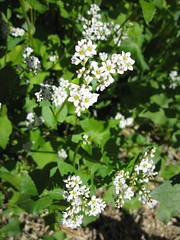
In the world of organic gardening, there are plenty of great resources available to both new and experienced organic gardeners alike. There are many e-guides, books, videos, and other resources available. This set of tips contains some of the best advice for helping a good organic gardener become a great organic gardener.
For the best results when gardening, the hole you dig for your plants should be very rustic; think jagged, rough and unappealing. If the shovel “glazes” any sides of the hole, leaving a smooth and compact surface, the roots may have trouble breaking through the soil in that area.
Organic Gardening
While organic gardening may seem like the latest craze, it has actually been around longer than any other form of garnering. From ancient Europeans to American Indians, organic gardening was just the accepted way of life. You can start a compost pile to create your own organic fertilizer for your organic garden. This will reduce your garbage production, reuse old refuse and recycle your fertilizer, leading to a more abundant garden.
Be sure to save your rainwater! Use barrels or buckets to trap rainwater to use in your organic garden. This prevents the need to pay for water used in your garden. Not only is rainwater free, but it is plentiful. When it comes to keeping your plants watered, few things are as ideal as rainwater.
A good way to garden is to get plants that complement each other. Some plants, when placed near other plants, actually help their neighbor plants grow. The companion plants will repel pests, and help enrich the soil so that the use of fertilizers and pesticides are not necessary. Plant herbs with strong smells next to vegetables in order to prevent insects from coming around.
An organic shade garden is a good choice for any beginner. These kinds of gardens are usually low in maintenance, which a lot of individuals like to hear. They don’t require as much watering, and that can save you a lot of time and effort. While this may mean slower growth to an extent, there will be much less weeds to deal with.
The organic mulch around trees and flowers should be approximately three inches deep. This method will save you money by conserving water and is good for the environment, too. As an added bonus, it often looks very pretty.
Make sure you place your trees so that they shade your home. That way, you are likely to see lower energy bills due to the shade offered by your trees.
Organic Garden
Healthy soil results in healthy plants capable of standing up to diseases and insects. Even if the insects still remain, your plants will not be affected as much as before.
Be aware of how and when to water your organic garden plants. Consider buying a soaker hose. A soaker hose will keep the base adequately watered and prevent the plant from drying out through evaporation. The early morning time is the best time to water your organic garden.
When you remove leaves from your yard, try using them to create an organic compost. When the leaves decompose, they are broken down into a nourishing, rich compost that plants love. You will soon realize that this is a great method of creating organic compost for your garden at no cost.
Depending on where you live, you may be able to continue harvesting some garden crops during the winter. You can protect these vegetables by covering them with a homemade tent. Find a few bean poles, and use them at each end of your garden bed by sticking them into the ground. Place a sheet over the poles and keep them down with bricks or rocks. This inexpensive tent can protect cabbage and kale, carrots, beets and potatoes to be harvested during the winter.
A good water source to use for your plants can obtained by washing you fruits and vegetable outside. Tap and rain water are often void of many nutrients. When you use the water that was used to rinse your veggies, many of the nutrients from the raw veggies are retained within the water used, so when you dump this into your garden, it provides additional nourishment. Avoid using any cleaners when you wash your vegetables off.
Organic Garden
Adequate mulch in your garden does a lot to cut down on water use. A thick layer of mulch helps prevent evaporation so you will not have to water as often. Mulch can be purchased locally from a garden center, created from compost or gathered from wood chippers. Don’t be afraid to use a great deal of it in your yard.
Now that you’ve reached the end of this article, you know exactly what it takes to create an organic garden. Keep learning more tricks and start practicing with a few plants. Using this advice, you will find the best way to create your dream organic garden.
Hunting for a fantastic hometown landscaping company? Speak to Carolina Curb Appeal Landscape designs for landscape designs in Pine Level North Carolina for awesome prices as well as terrific end results!


Recent Comments